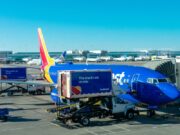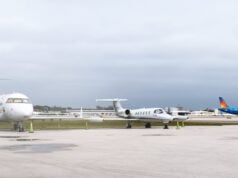COVID-19 has done dramatic damage to our collective national health, and this highly infectious virus has absolutely obliterated years of progress to the airlines’ efforts to build sustainable business models. Over the course of days, hundreds of pilots were disemployed due to the abrupt drop in travelers. Airlines are offering early retirement and partially paid voluntary leaves. Despite these efforts, many pilots feel as if they are counting the days until they receive similar notices. What aviation will look like after September 30 is uncertain. That economic uncertainty is unsettling, and we are not the only ones facing this; millions of our fellow Americans are entrenched in the same insecurity.

The unsung heroes are the thousands of individuals worldwide who continue to go to work each day – those deemed essential. These people are not only helping cure the sick, they are manufacturing the testing kits, developing vaccines, delivering goods and food, and flying people (and cargo) around our nation. That’s right – airline pilots are among those classified as essential employees. We must not forget our role in ensuring a safe national transportation network even while our fears of the future stress us.
I am not speaking from a position of comfort; my airline has been cancelling around 90% of flights since March. Due to this, I am now averaging less than one landing every two weeks. Not since the days I started flight training have I flown so little.
At first, the few days off were welcomed, but now each day on the ground fells wrong. I know these passenger loads are not sustainable for any airline. I also feel like I should be doing something to help. I’ve created a financial plan, evaluated options should I be furloughed and practiced a hefty amount of social distancing. Realistically, all I feelI can do is sit and wait; wait for the phone to ring with a flight or a furlough notice.
But, there is something we all can do, and that is to remember our role in aviation safety. We play a direct role in keeping our airspace safe and our nation moving. NTSB reports are fraught with accidents caused by a lack of pilot proficiency, and recency plays a critical role in aviation safety. Airline pilots do not normally face these challenges due to the semi-annual recurrent training and hundreds of hours of flying monthly. Those factors help drive our remarkable safety records. However, for many pilots, daily flying has dropped to monthly flying. It is incumbent upon each of us to self-regulate in order to maintain proficiency.
I have taken to reviewing my procedural flows weekly. It may sound lame, but going through flows and call-outs for a flight takes less than 30 minutes out of my Monday morning and keeps the routine in my head. I have also started tinkering with the more esoteric features of my iPad, WSI and my Jeppesen Chart app. Normally, after a long day of flying, I put my iPad on a charger and leave it alone. Now, I’ve started seeing what other functionality is beneath the surface.
Every airline for which I have flown also creates a monthly safety publication. While I can’t say every airline does, you should poke around and see if yours does. These safety reviews commonly discuss small procedural violations or areas of interest for pilots. Most of the time, FOQA data or ASAP commentaries are used. I’ve always found them to be a good read, but I’ve taken to reading the articles published before I was hired. The wealth of information is amazing, and it will make me a better captain in the future.
The hour or two a week has helped me stay fresh with my airplane, which boosts my performance in the flight deck. We all have a role in getting our nation to the other side of this crisis. Our responsibility is to ensure that every passenger who walks onto our airplane walks off. Use some of your time off to maintain, even enhance, your knowledge and skills.






















































































































Good read and well said